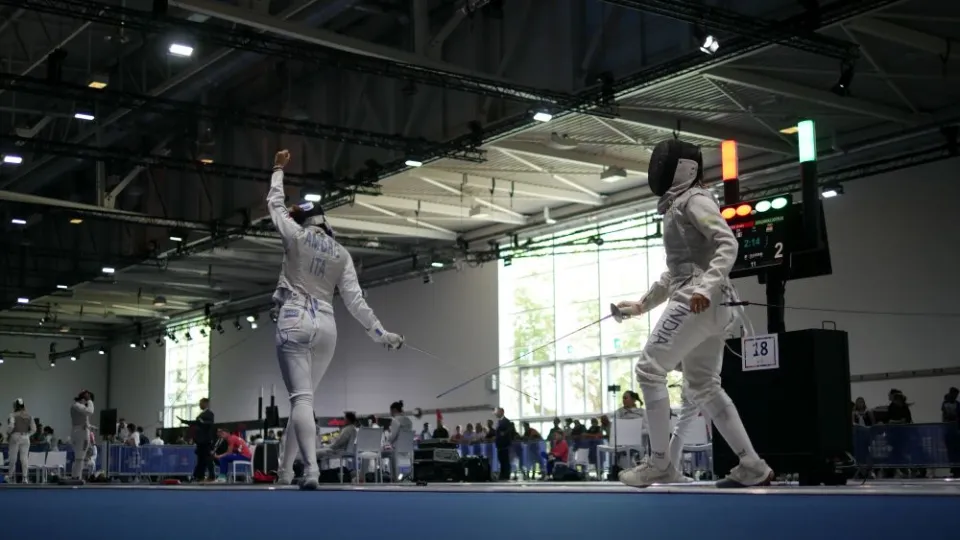
Silver Medal for Giulia Amore at the Universiade
They call them the “mini Olympics,” but the name doesn’t quite fit. The World University Games (WUG), a sort of Olympic Games reserved for those who, in addition to high-level sports, are also pursuing a university degree or university, are, especially in some disciplines, a top event that shares the same high technical and competitive level as the Olympic Games. Fencing, for example. “The Korean team that won gold in the women’s team foil event,” says Giulia Amore, a third-year student enrolled in the Bachelor of Science in Economics, Management, and Computer Science program at Bocconi University and a member of the Italian team that won silver, “is the same team competing in the World Championships. For those who practice fencing, the WUG is one of the most important events on the calendar.” On her second appearance at the Universiade, which took place in Germany, Giulia Amore is euphoric not only because of the medal she won and her excellent overall performance on the piste (sixth in the individual competition), but also because, together with her colleague Cosimo Bertini, she was the flag bearer for the Italian team during the opening ceremony held at Duisburg’s Reisen Arena. This is a career honor granted to few, even more special as it was completely unexpected: “We were all having dinner together with the fencing team, when our head of delegation announced that Federcusi (the Italian federation that oversees university sports) had decided to appoint two athletes from the fencing team as flag bearers, probably as a recognition of the results that our sport has always achieved, and that the two chosen were Cosimo Bertini and myself,” Giulia recounts with still visible emotion. “Perhaps they wanted to reward me for my sporting achievements (Giulia is the reigning European under-23 champion) but also for my studies at one of the most prestigious universities. The ceremony itself, in a packed stadium, with the flag in my hands, the cheering in the stands and my face on the big screen, was beautiful, an honor and a memory that I will always cherish.” As for her studies, Giulia will graduate in December, but she has been working in a curricular internship at the Sport & Entertainment Knowledge Center at SDA Bocconi for some time, focusing on dual careers: “We know that the United States invests a lot in athletes. What is the advantage, the added value that this brings both to the university and later in the world of work? By taking data from those universities and analyzing past data, for example from the 2000 Olympics to last year’s Olympics in Paris, we can understand the number of athletes, how many athletes have grown, how many athletes have been taken from universities through scholarships, and the evolution these athletes have had over time,” explains Giulia. “An athlete who studied, for example at Harvard, who competed in the 2000 Olympics, what are they doing now?
The main objective is to understand why Italian universities should invest in athletes. If not through actual scholarships, they should create special programs for high-level student-athletes, as Bocconi University is doing (https://www.bocconisport.eu/programmi-di-supporto-per-studenti-atleti).”
As for her career, both academic and in sport, Giulia is at a crucial crossroads: “My coach is moving to the US and I’ve had to make a change. Next year, I will be moving into a new work group in Pisa, so for the time being, I am leaving aside the idea of doing a master’s degree, because I would like to do it at Bocconi and, above all, I would like to enjoy the university experience to the full, which I cannot do if I am based in Pisa.” In the background, however, looms the big goal that athletes dream of from the first day they start any activity: the Olympics, in this case Los Angeles 2028: “Now I want to take a year or two to focus on that, which is my main sporting goal. In the meantime, since I’m someone who likes to do several things at once, I’ll take some training courses related to my studies. In 2027, a year before the Games, I’ll see if I really have a chance of being selected and then I’ll make my decision.” Essentially, this means either continuing her career with her sights set on Brisbane 2032 (“when I’ll only be 29”), or looking for a job: “Right now, I have a lot of things on my mind and I’m always open to possible changes: fencing, of course, but also the possibility of studying at an American university, perhaps an MBA at Bocconi. And then work: I would like to apply the big data and data analysis skills I have acquired over the years to the world of sport. It is the world I grew up in (Giulia is the daughter of Diana Bianchedi and Gianmarco Amore, both medal winners at major international fencing events) and the world I would like to stay in.”